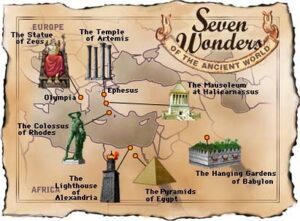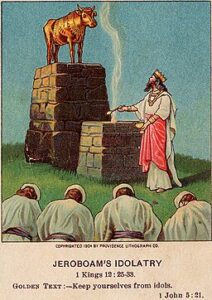 Imagine if Jesus wrote a personal letter to your church. What would He say in that message? Would His message be complimentary, or would He emphasize the need for change and improvement? Well, the answers to those questions were not a matter of speculation for seven churches of the New Testament era. Instead, Jesus provided those answers in the form of a personalized message to each church.
Imagine if Jesus wrote a personal letter to your church. What would He say in that message? Would His message be complimentary, or would He emphasize the need for change and improvement? Well, the answers to those questions were not a matter of speculation for seven churches of the New Testament era. Instead, Jesus provided those answers in the form of a personalized message to each church.
You see, Revelation chapters two and three comprise letters from Jesus to seven first-century congregations. Those letters contain personal messages to each church, but they also contain something more; they also contain important truths that are applicable to God’s people today.
Earlier in Revelation 1:11 we read this…
“Write down what you see, and send it to the seven churches: Ephesus, Smyrna, Pergamum, Thyatira, Sardis, Philadelphia, and Laodicea” (NLT).
This refers to the seven letters we’ll see beginning here in Revelation chapter two. But before we get to those letters, let’s first review their format. Each letter begins much like we might begin a piece of correspondence today. They start with a “To:” that is addressed to the angel of each church. That opening address is then followed by a “From:” that features a self-description of the One who sent it.
For example…
“Write this letter to the angel of the church in Ephesus. This is the message from the one who holds the seven stars in his right hand, the one who walks among the seven gold lampstands…” (Revelation 2:1 NLT).
This naturally leads to a question: why are these letters addressed “…to the angel” of each church? To answer that question, it’s helpful to consider the word “angel” more closely. While the term “angel” often refers to a supernatural being today, this word (“angelos“) simply means “messenger” in the original language of Revelation. (1) This may sound familiar to those who have traveled to southern California in the United States, for it explains why the city of “Los Angeles” is known as “The City of Angels.”
With respect to the letters of Revelation chapters two and three, we can understand this reference to “…the angel of the church” in two ways…
- Each church may have a “guardian angel.” If this is the case, then Jesus is dictating each letter to that entity.
- However, it’s probably better to understand this reference in a different way: Jesus is speaking to the human leader of each church in the sense that every church leader is (or should be) a messenger of God.
We’ll continue our overview of Revelation chapter two next.
Image Credit: Photo by Roman_Drits from Freerange Stock
(1) G32 – angelos – Strong’s Greek Lexicon (kjv). (n.d.). Blue Letter Bible. https://www.blueletterbible.org/lexicon/g32/kjv/tr/0-1/
As we read through Jesus’ letters to the churches of Revelation chapters two and three, we’ll find that there are certain commonalties within these messages. For instance, we’ll find that Jesus gets directly to His point in each of these letters. He will address the condition of each church and offer a message of praise and approval if the church deserves it. In other instances, He will present a message of reprimand and disapproval. Sometimes, He will offer both. Jesus tells each church what He wants them to do regarding the issues that exist and warns them about what will happen if they fail to act.
Finally, Jesus will end each letter with a statement of encouragement and a promise to those who are victorious in living a God-honoring life. He then closes each letter with the same statement: “Anyone who is willing to hear should listen to the Spirit and understand what the Spirit is saying to the churches” (NLT). This tells us that the things we read in these letters are for anyone who will listen and apply them- including those of us who live in the 21st century.
The first of these letters was delivered to the church that met in the ancient city of Ephesus. While the New Testament book of Colossians mentions the city of Laodicea (Revelation 3:14-22) and Acts chapter sixteen features the city of Thyatira (Revelation 2:18-29), Ephesus was a far more prominent city from a Biblical perspective.
The first-century city of Ephesus was located in an area of the world that encompasses the modern-day nation of Turkey. At the time of this letter, Ephesus was a busy metropolitan area. It held a strategic position within the Roman Empire and featured a large harbor that facilitated the shipment of goods and passengers to various ports throughout the known world. Ephesus was also a place where wealthy first-century residents might keep a summer home.
 Ephesus boasted a large theatre with a seating capacity of approximately 20-30,000 people that appears in Acts 19:29. In addition, the city featured an extensive library for the academically inclined. However, Ephesus was perhaps best known as the home of the Temple of Diana, a structure that was considered to be among the seven wonders of the ancient world.
Ephesus boasted a large theatre with a seating capacity of approximately 20-30,000 people that appears in Acts 19:29. In addition, the city featured an extensive library for the academically inclined. However, Ephesus was perhaps best known as the home of the Temple of Diana, a structure that was considered to be among the seven wonders of the ancient world.
Diana (or Artemis as she was also known) was a pagan deity who was worshiped as the “goddess” of the moon, hunting and wild animals. Her Temple was constructed of marble and stood 425 feet (130m) long and 220 feet (67m) wide. One hundred and twenty-seven vertical support columns standing sixty feet (18m) tall served to uphold this impressive structure.
We’ll continue our look at Jesus’ message to this church next.
Image Credit: Hamilton, N. H. (n.d.). Seven Wonders of Ancient World, undated. Flickr. https://www.flickr.com/photos/nat507/44980191934>Roman_Drits
The ancient city of Ephesus was a prominent business, cultural, and religious center at the time of Jesus’ letter to the Christian community there. With these things in mind, here is how Jesus opened His message to the church at Ephesus…
“To the angel of the church of Ephesus write, ‘These things says He who holds the seven stars in His right hand, who walks in the midst of the seven golden lampstands’” (Revelation 2:1).
These references to “stars” and “lampstands” were explained earlier in Revelation 1:20: “The mystery of the seven stars that you saw in my right hand and of the seven golden lampstands is this: The seven stars are the angels of the seven churches, and the seven lampstands are the seven churches” (NIV). So, after this brief introduction, Jesus continued by saying…
“I know your works, your labor, your patience, and that you cannot bear those who are evil. And you have tested those who say they are apostles and are not, and have found them liars” (Revelation 2:2).
This passage begins with an important statement: “I know all the things you do” (NLT). This was not only true of the ancient Ephesians, but it is also true of us as well. You see, Jesus is someone who can say to everyone, “I know your works.” That realization should be troubling to those who may be seeking to hide or disguise their sins, or those who feel as if they can escape the consequences of their misconduct. This passage thus reminds us that Jesus sees every secret thought, every hidden motive, and everything we’ve ever done- and He alone can say, “I know your works.”
On the other hand, let’s consider a scenario where someone faced a series of negative consequences, despite the fact that he or she chose to act with integrity. Or perhaps there was a time when someone made a God-honoring choice when no one seemed to notice or care. Or maybe someone rejected an opportunity to lie, steal, retaliate, or produce an inferior work product, and chose instead to work “…as though you were serving the Lord himself” (Colossians 3:23 CEV).
It may have seemed as if no one was watching in those instances. But Someone was watching, and Someone continues to watch today. No matter what the situation, it helps to remember that Jesus knows all the things we do. Happily for the Ephesian church, the words, “I know your works“ meant something good, as we’ll see next.
“I know your works as well as your labor and steadfast endurance, and that you cannot tolerate evil. You have even put to the test those who refer to themselves as apostles (but are not), and have discovered that they are false” (Revelation 2:2).
When Jesus speaks of labor and endurance in this passage, He uses a word that alludes to “intense labour united with trouble and toil.” (1) So it seems that there weren’t many lazy individuals within this church. In fact, it was just the opposite; they were determined to persevere when things became difficult.
He then continued by saying, “I know you don’t tolerate evil people. You have examined the claims of those who say they are apostles but are not. You have discovered they are liars” (NLT). This is especially interesting when we consider the Apostle Paul’s earlier warning to this fellowship…
“I know that false teachers, like vicious wolves, will come in among you after I leave, not sparing the flock. Even some men from your own group will rise up and distort the truth in order to draw a following. Watch out!…” (Acts 20:29-31 NLT)
So it appears that the Ephesian church took Paul’s warning seriously and Jesus responded with a message of approval. More good things follow in the next verse…
“and you have persevered and have patience, and have labored for My name’s sake and have not become weary” (Revelation 2:3).
 Judging from this portion of Jesus’ letter, we may conclude that the church at Ephesus featured a group of individuals who refused to give up, even during times of hardship. If the Christians at Ephesus “patiently suffered” for their belief in Christ, then it can only mean that they remained steadfast in their commitment to Him despite the trials, adversities, and difficulties they encountered. It also seems reasonable to assume that the members of the Ephesian church displayed unwavering determination and resilience in the face of various challenges. Finally, we can say that the Ephesian Christians exhibited faithfulness in dealing with stressful conditions.
Judging from this portion of Jesus’ letter, we may conclude that the church at Ephesus featured a group of individuals who refused to give up, even during times of hardship. If the Christians at Ephesus “patiently suffered” for their belief in Christ, then it can only mean that they remained steadfast in their commitment to Him despite the trials, adversities, and difficulties they encountered. It also seems reasonable to assume that the members of the Ephesian church displayed unwavering determination and resilience in the face of various challenges. Finally, we can say that the Ephesian Christians exhibited faithfulness in dealing with stressful conditions.
So things seemed to be going well for the Christian community at Ephesus according to Revelation 2:2-3…
- The Christians in Ephesus were hard workers.
- They didn’t tolerate people who dishonored God.
- They tested those who claimed to be spiritual leaders and representatives of God to verify their truthfulness.
- Those who weren’t what they claimed to be were exposed as liars.
The church at Ephesus thus offers a good example for us to follow today. However, Jesus had a few additional things to say to this fellowship, and we’ll consider that portion of His letter next.
Image Attribution: Perseverance by Nick Youngson CC BY-SA 3.0 Pix4free
(1) G2873 – kopos – Strong’s Greek Lexicon (kjv). (n.d.). Blue Letter Bible. https://www.blueletterbible.org/lexicon/g2873/kjv/tr/0-1/
Despite the positive developments that characterized the first-century church at Ephesus, there was a certain matter that required immediate attention…
“Nevertheless I have this against you, that you have left your first love” (Revelation 2:4).
So what is the “first love” that Jesus speaks of here? To answer that question, we can look in on a conversation that occurred between Jesus and a religious teacher that is chronicled for us in Mark chapter twelve. That passage relates the account of a spiritual leader who heard Jesus speak to another group of religious authorities. He was impressed by the way Jesus answered a seemingly impossible question, and His response prompted the religious leader to ask a question of his own: “…Which is the first commandment of all?” (Mark 12:28).
The following verses provide us with Jesus’ response…
“Jesus answered him, ‘The first of all the commandments is: ‘Hear, O Israel, the Lord our God, the Lord is one. And you shall love the Lord your God with all your heart, with all your soul, with all your mind, and with all your strength.’ This is the first commandment’” (Mark 12:29-30).
This answer offers some valuable insight into the term “first love” from Revelation 2:4. When Jesus says, “…I have this against you, that you have abandoned the love you had at first” (ESV), it implies that the Christians in Ephesus had departed from their greatest and most important love- their love for God.
 In our text from the Gospel of Mark, Jesus informs us that humanity’s primary job description involves the responsibility to love God with all our heart, soul, mind, and strength. Thus, our highest-ranking love should be expressed toward God. Unfortunately, it seems as if the Christians in Ephesus were so busy doing good things that they forgot the most important thing: to love God first and foremost.
In our text from the Gospel of Mark, Jesus informs us that humanity’s primary job description involves the responsibility to love God with all our heart, soul, mind, and strength. Thus, our highest-ranking love should be expressed toward God. Unfortunately, it seems as if the Christians in Ephesus were so busy doing good things that they forgot the most important thing: to love God first and foremost.
Of course, this message is just as applicable today (if not more so) as it was for the first-century church at Ephesus. We can gauge these potential vulnerabilities in our own lives with two questions:
- Has there ever been a time when I loved God more than I do now?
- Are there things in my life that have a higher priority than Christ?
If the answer to one or both of those questions is “yes,” then we should consider the possibility that Jesus’ message to the Ephesian church in Revelation 2:4 applies to us as well. Fortunately, we can address these concerns by following the instructions that Jesus offers next.
Image Attribution: pickpik.com
“Remember therefore from where you have fallen; repent and do the first works, or else I will come to you quickly and remove your lampstand from its place–unless you repent” (Revelation 2:5).
For some, the word “repent” is associated with the image of a wild-eyed radical who carries a sign warning others that “The End Is Near!” However, repentance actually involves a change of mind that leads to a change of behavior. Genuine repentance (like the kind mentioned here in Revelation 2:5) thus implies more than just a feeling of sorrow or regret.
Genuine repentance always involves action, much like a motor vehicle driver might stop from going the wrong way by making a U-turn. In this instance, “turning around” for the Ephesian Christians meant returning to Christ as their first love (Revelation 2:4). Those who prioritize their relationship with Jesus through prayer and daily devotional readings in the Scriptures are those who are well positioned to maintain this kind of “first love” relationship with Him.
However, a “first love” relationship with Christ isn’t just a good idea, for there are repercussions for those who choose an alternative path…
“…If you do not repent, I will come to you and remove your lampstand from its place” (Revelation 2:5 NIV).
If we fail to put our relationship with Christ first, we set a negative example for those around us. We also face the prospect of losing the good things that God seeks to give those who genuinely love Him. In such instances, a church or an individual may continue to self-identify as “Christian” with little or no connection to Christ, except in name only.
Unfortunately, this seems to be the fate that befell the Christian community at Ephesus. That busy, dynamic city of the first century is little more than a ruin today and the church there has long since ceased to exist. This historic overview reminds us that we make real choices in real time each day. Those choices lead to real consequences that may produce a lasting effect in the present, as well as the future. Thus, we ignore this admonition at our risk.
Now this is a point within this letter where we might expect Jesus to conclude His remarks. However, He had one additional message to share with the church at Ephesus: “But you have this in your favor: You hate the practices of the Nicolaitans, which I also hate” (Revelation 2:6 NIV). There are only two places in the entire New Testament where Jesus expresses His hatred for something. Those two places are here in Revelation chapter two. We’ll consider this emotionally charged response next.
“But this you have, that you hate the deeds of the Nicolaitans, which I also hate” (Revelation 2:6).
So who were the Nicolaitans and what were they doing to provoke this kind of reaction from Jesus? We can respond to that question by considering two general theories regarding the Nicolaitans.
One theory holds that the Nicolaitans were the followers of someone (presumably known as Nicolaus) who taught and encouraged others to engage in various types of immoral behaviors. In view of the Biblical admonitions regarding such conduct, it’s easy to see why Jesus would express His hatred concerning such teachings.
Another view is grounded in the meaning of the word “Nicolaitan.” In the original language of the book of Revelation, the word “Nicolaitan” is derived from two words: nikos (meaning to vanquish or conquer) and laos (meaning people). Thus, we can interpret the word “Nicolaitan” as a reference to those who seek to conquer or lord over people.
Because of this, some believe that the Nicolaitans comprised those who sought to exercise a God-like degree of authority over others. Again, it’s easy to see why Jesus would strongly oppose those who followed that practice. Either way, it doesn’t take a great deal of common sense to know that it’s a bad idea to support something Jesus hates.
Jesus then closed His letter with these words…
“He who has an ear, let him hear what the Spirit says to the churches. To him who overcomes I will give to eat from the tree of life, which is in the midst of the Paradise of God” (Revelation 2:7).
The “tree of life” referenced here first appeared in Genesis 2:9. “Eating from the tree of life” is a poetic way of referring to eternal life with God in a perfect environment; a paradise where we will enjoy a loving, honest and genuine relationship with God forever. As we’re told later in the book of Revelation, this is a place where “there shall be no more death, nor sorrow, nor crying. There shall be no more pain, for the former things have passed away” (Revelation 21:4).
Finally, we have this reference to “those who overcome.” In respect to this idea, its been said that there are three obstacles that every God-honoring person must subdue. The first obstacle is the everyday world that goes about it’s business as though God did not exist. The second obstacle is our human tendency to think and act in ways do not align with God’s intent for humanity. The third obstacle is represented by Satan, a powerful, unseen spiritual enemy.
Taken together, these obstacles are commonly known as the world, the flesh, and the devil. While overcoming these obstacles may be difficult, a great reward awaits those who do so though the ability that God provides.
“And to the angel of the church in Smyrna write, ‘These things says the First and the Last, who was dead, and came to life” (Revelation 2:8).
 The Roman Empire ruled over most of the known world in the era when the book of Revelation was originally written. One strategy employed by the Empire to help ensure loyalty among its citizens involved a requirement to worship the Roman Emperor as a divine being. Those who lived within the Roman Empire were required to burn incense once a year in honor of the Emperor and publicly affirm his divinity. Once a citizen fulfilled that requirement, he or she received a certificate of loyalty to the Roman Empire.
The Roman Empire ruled over most of the known world in the era when the book of Revelation was originally written. One strategy employed by the Empire to help ensure loyalty among its citizens involved a requirement to worship the Roman Emperor as a divine being. Those who lived within the Roman Empire were required to burn incense once a year in honor of the Emperor and publicly affirm his divinity. Once a citizen fulfilled that requirement, he or she received a certificate of loyalty to the Roman Empire.
Of all the cities under Roman jurisdiction, the city of Smyrna (pronounced “smer-na”) was one that stood out for its dedication to that initiative. In fact, Smyrna successfully competed against eleven other cities in an effort to construct the first temple dedicated to the worship of the Roman Emperor. But the worship of such “deities” wasn’t limited to the Emperor in Smyrna. Citizens of Smyrna also worshipped other pagan gods such as Zeus and Apollo, among others.
Smyrna was a seaport city that was located in what is now the modern-day country of Turkey. It was well-known in the first-century for it’s impressive architecture and wide, paved roadways. Smyrna was said to be the birthplace of the ancient poet Homer, and functioned as an important commercial center that imported and exported many types of goods.
This commercial activity helped establish Smyrna as a wealthy and prosperous city in the days of the first century. But unlike the ancient city of Ephesus mentioned earlier, the city of Smyrna still exists today under the contemporary name Izmir.
Jesus opened His letter to the church at Smyrna by identifying Himself as the First and the Last, the one who was dead and is alive. These terms are important because they establish several truths regarding the person of Christ. For instance, the term “First and Last” is associated with the all-powerful, eternal God who is the beginning and end of everything whenever it appears in a Biblical context.
Then there is the reference to “(He) who died and came to life again” (NIV). This description clearly identifies the speaker as Jesus, the One who died and rose from the dead according to Luke chapter twenty-four. So when these two references are taken together, they establish the clear Biblical teaching that Jesus is God.
Image Attribution: I, Sailko, CC BY-SA 3.0, via Wikimedia Commons
“I know your works, tribulation, and poverty (but you are rich); and I know the blasphemy of those who say they are Jews and are not, but are a synagogue of Satan” (Revelation 2:9).
Just as we saw in His earlier message to the church at Ephesus, Jesus knew everything about the church at Smyrna. But how is it that the Christians of Smyrna were so poor while living in such a wealthy city? To answer that question, it helps to consider some of the political realities that were facing the church within that community.
First, it’s important to remember that the city of Smyrna promoted Emperor worship, along with the worship of other pagan deities during that time. A Christian who was serious about his or her relationship with Christ in that era was not likely to get along well in that environment. That may partially explain the reason why the Christians in Smyrna were suffering in poverty.
But there may have been another contributing factor as well. You see, Smyrna also featured a first-century version of modern day labor unions called “guilds” during that time. These guilds served as organizations for craftsmen and business owners that established rules and requirements for various industries. One such requirement involved an oath of loyalty to Caesar. Those who refused to declare that “Caesar is Lord” were denied membership within these guilds.
This meant that Christians who refused to worship the Emperor in Smyrna likely had difficulty finding employment. Furthermore, it was a traitorous offense for anyone to refuse to worship the Emperor during that period. The Roman government could respond to such acts of “disloyalty” by confiscating financial assets or property. These harsh realities may help explain why the Christians in Smyrna were so poor in a city of such great wealth.
In fact, when Jesus says, “I know… your poverty,” He uses a word that means. “the condition of one destitute of riches and abundance.” (1) But despite these things, Jesus also told the church at Smyrna, “… you are rich.” How could Jesus say such a thing to those who possessed so little? Well, it seems that Jesus was reminding His readers of something He said earlier in Matthew 6:19-21…
“Don’t store up treasures here on earth where they can erode away or may be stolen. Store them in heaven where they will never lose their value and are safe from thieves. If your profits are in heaven, your heart will be there too” (TLB).
(1) G4432 – ptocheia – Strong’s Greek Lexicon (kjv). (n.d.). Blue Letter Bible. https://www.blueletterbible.org/lexicon/g4432/kjv/tr/0-1/
“I know your tribulation and your poverty (but you are rich) and the slander of those who say that they are Jews and are not, but are a synagogue of Satan” (Revelation 2:9 ESV).
This portion of Jesus’ letter to the ancient church at Smyrna tells us that it is possible to live in poverty, yet still be rich. Conversely, it is also possible to possess an abundance of financial and material wealth, yet still be poor. This serves to remind us of Jesus’ message from Luke 12:15: “Beware, and be on your guard against every form of greed; for not even when one has an abundance does his life consist of his possessions” (NASB).
 The Old Testament book of Ecclesiastes further illustrates the challenge facing those who are driven to accumulate financial wealth and/or material possessions: “He who loves money shall never have enough. The foolishness of thinking that wealth brings happiness! The more you have, the more you spend, right up to the limits of your income…” (Ecclesiastes 5:10-11 TLB).
The Old Testament book of Ecclesiastes further illustrates the challenge facing those who are driven to accumulate financial wealth and/or material possessions: “He who loves money shall never have enough. The foolishness of thinking that wealth brings happiness! The more you have, the more you spend, right up to the limits of your income…” (Ecclesiastes 5:10-11 TLB).
For instance, there are some who are compelled to relentlessly buy, trade, or upgrade in order to have the latest model or version of something. Unfortunately, those who feel the need to accumulate such things are bound to become disappointed eventually. Today’s fast-moving development cycle demands continuous investment in order to acquire the latest version of a product or service, and there will inevitably be something newer or better than whatever we already possesses.
This means that we will often have to spend more just to keep up- and that ultimately leads to an ongoing cycle of discontentment and dissatisfaction. Philosophers refer to this condition as the “Hedonistic Paradox,” for it describes the self-defeating nature of this mindset. However, there is another concern facing those who seek to amass a stockpile of wealth or possessions…
“But people who long to be rich soon begin to do all kinds of wrong things to get money, things that hurt them and make them evil-minded and finally send them to hell itself. For the love of money is the first step toward all kinds of sin. Some people have even turned away from God because of their love for it, and as a result have pierced themselves with many sorrows” (1 Timothy 6:9-10 TLB).
Finally, the New Testament book of 1 Timothy tells us “…godliness with contentment is great gain” (1 Timothy 6:6). That was the path chosen by the Christian community at Smyrna, and Jesus voiced His approval via this message to them.
Image Attribution: mohamed hassan via Stockvault.net
“I know your affliction and poverty, yet you are rich. I know the slander of those who say they are Jews and are not, but are a synagogue of Satan” (Revelation 2:9 HCSB).
“Slander” refers to the deliberate spread of false information in order to damage someone’s reputation. Today, we might use the term “character assassination” to describe such conduct.
Unfortunately, those who were targeting the Christians of Smyrna in this manner were acting as double-agents. On the outside, they displayed an external façade of God-honoring spirituality. But internally, they pursued an agenda that was aligned with the devil’s priorities. However, Jesus saw through that charade and furnished the church at Smyrna with an accurate assessment of their real identity: “…theirs is a synagogue of Satan” (NLT).
“Do not fear any of those things which you are about to suffer. Indeed, the devil is about to throw some of you into prison, that you may be tested, and you will have tribulation ten days. Be faithful until death, and I will give you the crown of life” (Revelation 2:10).
A “prison” of that era was not like the penal institutions that typically exist today. For example, there were no beds, toilet facilities, showers, or regular meals available to prisoners of that era. Instead, prisoners were usually chained in areas that were dark, cold, damp, and dirty. While these penitentiaries sometimes functioned as places of incarceration for criminal behavior, they primarily served as detention centers for individuals who were awaiting trial or execution.
Given these realities, this disclosure from Revelation 2:10 surely represented unwelcome news to the Christians who lived in Smyrna. Nevertheless, it’s important to recognize some important facets of this message…
- First, Jesus was fully aware of this pending test. He was not surprised or caught off-guard by what was about to take place.
- He advised the Christian community at Smyrna that their period of tribulation would be limited to an interval of “ten days.”
- Finally, Jesus promised a reward for those who were “faithful unto death.”
So Jesus told His followers…
- What was going to happen.
- Why it was going to happen.
- How long it would last.
- The end result for those who remained faithful to Him.
Thus, Jesus was in control of the events that were about to take place in Smyrna, and the same holds true of our lives as well. And even though the devil had a part to play in this period of testing, it was only because it suited Jesus’ purpose in permitting him to do so.
“Do not fear what you are about to suffer. Behold, the devil is about to throw some of you into prison, that you may be tested, and for ten days you will have tribulation. Be faithful unto death, and I will give you the crown of life” (Revelation 2:10 ESV).
Much like the ancient church at Smyrna, God may sometimes schedule periods of testing in the lives of those who follow Him. During those periods, it is often helpful to view them as opportunities to demonstrate the kind of faith that is pleasing to God. For instance, God may permit such things to enter our lives to strengthen us, increase our faith, develop good character, or serve as an example to others. This shift in perspective from “a trial” to “an opportunity” can help us view such things in a positive manner.
“He who has an ear, let him hear what the Spirit says to the churches. He who overcomes shall not be hurt by the second death” ‘ (Revelation 2:11).
Before we define this reference to “the second death” from Revelation 2:11, we should first consider the nature of death in a larger sense. The fundamental meaning of “death” relates to the idea of “separation” from a physical or spiritual perspective. Physical death occurs when a person’s spirit separates from his or her body, for “…the body without the spirit is dead…” according to James 2:26. In Biblical terms, this is called the “first death.”
The book of Revelation defines spiritual death as the “second death” that denotes a state of perpetual separation from God. Revelation 21:7-8 explains this concept in greater detail…
“All who are victorious will inherit all these blessings, and I will be their God, and they will be my children. But cowards who turn away from me, and unbelievers, and the corrupt, and murderers, and the immoral, and those who practice witchcraft, and idol worshipers, and all liars – their doom is in the lake that burns with fire and sulfur. This is the second death” (NLT).
One commentator offers a further explanation…
“The Bible teaches that there are two deaths: The first is physical, the second is spiritual… The second death is basically God granting people their earthly wish: to be apart from God. People who live their lives wanting nothing to do with God will spend eternity that way.” (1)
This second death stands opposed to the eternal life that Jesus promises to those who believe in Him (see John 3:16-18). Those who believe in Christ and accept His sacrificial death on their behalf have no need to fear this second death.
(1) Daniel, R. (n.d.). Revelation 19:1-20:15: Ron Daniel’s Bible Studies. Revelation 19:1-20:15 https://rondaniel.com/library/66-Revelation/Revelation1901.php
Revelation chapters two and three contain seven letters from Jesus to various first-century churches. The third church to receive one of these letters was located in the city of Pergamum (also known as Pergamos). Pergamum was located fifty to seventy-five miles (80-120 km) away from the ancient city of Smyrna that received Jesus’ second letter.
Pergamum was an urban area that gained recognition for its contributions to the fields of education, art, healthcare, and literature. In addition, it reportedly housed a library with a staggering collection of over 200,000 books. Unfortunately, Pergamum was also noted for its involvement with pagan religions. For example, Pergamum featured a temple dedicated to the Greek god Zeus that stood forty feet (12m) tall and was located atop a hill that was eight hundred feet (244m) high. Other temples were dedicated to the worship of the Roman Emperor, as well as a pagan deity named Asklepios.
It’s uncertain how the church in Pergamum began, but some believe that the Apostle Paul helped establish the church during one of his missionary journeys. While Jesus’ letter to this fellowship is relatively brief, it tells us two important things. First, it reveals that this congregation had several admirable qualities that are worthy of emulation. However, it also tells us that the church at Pergamum tolerated some things that Jesus found intolerable.
Because of this, Jesus’ letter to the church at Pergamum reminds us of the need to measure our spiritual lives against the Biblical Scriptures to ensure that we are not slipping back in any areas…
“And to the angel of the church in Pergamos write, ‘These things says He who has the sharp two-edged sword” (Revelation 2:12).
In addition to what we read here in Revelation 2:12, the book of Revelation features four additional references that link Jesus with a sword that is usually described as sharp and/or double-edged (see Revelation 1:16, 2:16, 19:15, and 19:21). Of those five references, four of them associate that sword with Jesus’ mouth. Since a sword is typically worn at the hip or slung over one’s shoulder, how should we understand these references?
Well, the fact that someone’s mouth is a bad (and impossible) place to keep a sword should alert us to the fact that there is a deeper meaning behind this reference. You see, the Scriptures sometimes use the word “mouth” to refer to the words we speak. We can find two such examples in the Biblical books of Isaiah (53:9) and Job (15:6). In fact, we sometimes use the word “mouth” in a similar manner today whenever we refer to a braggart as someone who has a “big mouth.”
We’ll expand our look at this idea next.
“And to the angel of the church in Pergamum write: ‘The words of him who has the sharp two-edged sword” (Revelation 2:12 ESV).
A sword is often used as a Biblical symbol for judgment, power, or enforcement (see Psalm 22:20 and Romans 13:3-4). Knowing this, we can make good sense of this passage if we associate Jesus’ words with the power of a sharp, double-edged sword. Hebrews 4:12 serves to clarify this idea when it tells us, “…the word of God is living and active. Sharper than any double-edged sword, it penetrates even to dividing soul and spirit, joints and marrow; it judges the thoughts and attitudes of the heart” (NIV).
Thus, we can say that Jesus impresses an important need upon His readers at the start of this letter: they must pay close attention to what He is about to say.
“I know where you dwell, where Satan’s throne is. Yet you hold fast my name, and you did not deny my faith even in the days of Antipas my faithful witness, who was killed among you, where Satan dwells” (Revelation 2:13).
According to Jesus’ statement in this passage, the city of Pergamum served as Satan’s base of operations during this period. In fact, a look at the NIV translation of this verse (as well as the original language) reveals that Jesus actually says this twice: “I know where you live… where Satan has his throne… Antipas, my faithful witness… was put to death in your city- where Satan lives.”
In considering this reference, it’s important to remember the pagan religious practices that were prevalent in Pergamum during that period. Whenever a collective group of individuals worship anyone or anything other than the one true God, they engage in practices that are rooted in satanic influences. For instance, consider the following passages from the Old and New Testaments…
“They served their idols, Which became a snare to them. They even sacrificed their sons And their daughters to demons” (Psalm 106:36-37).
“Rather, that the things which the Gentiles sacrifice they sacrifice to demons and not to God, and I do not want you to have fellowship with demons” (1 Corinthians 10:20).
The concentration of false religious worship in Pergamum may have been so high that satanic activity was at its very core. So, according to Jesus, the church in Pergamum coexisted in the same town where humanity’s greatest spiritual enemy had established a command post. That’s what the Christians in Pergamum were up against, and Jesus commended them for their loyalty to Him.
“I know where you live — where Satan’s throne is. Yet you continue to cling to my name and you have not denied your faith in me, even in the days of Antipas, my faithful witness, who was killed in your city where Satan lives” (Revelation 2:13 NET).
Jesus took some time to mention a person named Antipas in this portion of His letter to the church at Pergamum, a man whom He described as “my faithful witness.” The name Antipas means “against all,” and it appears that he was someone who lived up to the meaning of his name. Antipas was willing to give up his life to stand for Christ in a culture where Satan felt right at home.
Unfortunately, we know nothing else about Antipas beyond this reference in the book of Revelation. Yet even though Antipas is someone who is unknown to us, he was obviously well known to Christ. If given the choice, we would be wise to seek the latter option as well.
So the Christians in Pergamum earned praise from Jesus for their faithfulness in the midst of a difficult environment. But that is not to say that there weren’t any issues within this church…
“But I have a few things against you, because you have there those who hold the doctrine of Balaam, who taught Balak to put a stumbling block before the children of Israel, to eat things sacrificed to idols, and to commit sexual immorality” (Revelation 2:14).
If we take some time to read through the Biblical Scriptures, we will quickly discover that many Biblical personalities displayed some prominent character issues. Balaam is an individual who serves as a particularly notable example. A detailed account of Balaam’s life appears in our study of 2 Peter chapter two and explains why Jesus used his life as an object lesson in His letter to the church at Pergamum.
In short, Balaam served as an example of a person who displays a veneer of spirituality but is “only in it for the money.” He was someone who maintained an external religious appearance that masked a hidden agenda. In Balaam, we also have someone who was willing to sell others out for the right financial price. Finally, Balaam merchandised a God-given spiritual gift for personal gain. In the words of 2 Peter 2:15, Balaam was someone “…who loved the wages of unrighteousness.”
Those who engage in similar practices should note Jesus’ clear displeasure with such conduct. As we’ll see, no one gets away with such behavior and Jesus’ message to the church at Pergamum should prompt us to remember the words of Romans 2:6: “[God] will render to each one according to his deeds.”
“Thus you also have those who hold the doctrine of the Nicolaitans, which thing I hate” (Revelation 2:15).
As we saw earlier in our look at Jesus’ letter to the church at Ephesus, there are two theories concerning the Nicolaitans mentioned here. According to one view, the Nicolaitans comprised a group of individuals who advocated for a self-indulgent lifestyle and encouraged others to engage in a range of immoral behaviors. Another perspective suggests that the Nicolaitans were composed of those who sought to lord over others in a manner reserved only for God.
In either case, the issue facing the church at Pergamum did not involve the mere presence of the Nicolaitans or individuals like Balaam. Those types of people are always likely to be present within our church communities or in other aspects of our lives. The problem stemmed from the church’s decision to tolerate those who held their views. That approach created a platform that enabled these individuals to spread their negative influence among others.
Evidently, no one in Pergamum seemed willing to step forward to confront the Nicolaitans and advise them to correct their attitudes and behaviors. This indicates that the church at Pergamum was on the verge of adopting some heretical doctrines. It also suggests that this congregation was engaging in an unhealthy form of compromise. We’ll discuss these concerns at greater length in our upcoming look at Jesus’ letter to the church at Thyatira.
That led Jesus to issue a somber warning…
“Repent, or else I will come to you quickly and will fight against them with the sword of My mouth” (Revelation 2:16).
It is difficult to underestimate the seriousness of this message. The sword mentioned here was designed to be worn over the shoulder for use in combat situations. This was the weapon of a warrior, and it was created to inflict serious damage. So the underlying idea behind this passage appears to be this: “Turn around and address these issues. If you fail to do so, I will intervene swiftly and take action.”
“Repent, or else…” is not the type of message we should seek to hear from Christ. Even though the church at Pergamum had a good example like Antipas within their fellowship, that did not permit them to compromise with others who promoted heretical beliefs.
We should also take note of an important detail within this portion of Jesus’ message: “I will come to you… and will fight against them.” A person who holds such views cannot hide within a “good” church. If he or she remains unrepentant, Jesus may elect to address such conduct at a time and place of His choosing.
“He who has an ear, let him hear what the Spirit says to the churches. To him who overcomes I will give some of the hidden manna to eat. And I will give him a white stone, and on the stone a new name written which no one knows except him who receives it” (Revelation 2:17)
After the people of Old Testament Israel departed from the nation of Egypt, God miraculously fed them with something called “manna.” The word manna literally means, “what is it?” and we can find a description of it in Exodus chapter sixteen. God used this edible provision to feed the Israelites during their forty-year journey to the land of God’s promise.
This reference to the “hidden manna” here in Revelation 2:17 may relate to something Jesus once said as recorded in the Gospel of John…
“I am the bread of life. Your fathers ate the manna in the wilderness, and are dead. This is the bread which comes down from heaven, that one may eat of it and not die. I am the living bread which came down from heaven. If anyone eats of this bread, he will live forever; and the bread that I shall give is My flesh, which I shall give for the life of the world” (John 6:48-51).
Since Jesus is the bread of life who provides eternal life for those who accept Him, He may be speaking of Himself in referencing this “hidden manna” that is reserved for those who overcome.
Jesus’ letter to the church at Pergamum then closes with the following promise: “And I will give to each one a white stone, and on the stone will be engraved a new name that no one knows except the one who receives it” (NLT). Some commentators view this stone in the context of an ancient legal defendant. At the end of a judicial proceeding, a person on trial reportedly received a white stone to indicate acquittal or a black stone to signify guilt. Other sources link this stone with a kind of athletic trophy or a symbol of acceptance.
Finally, this reference to “…a name that is known only to the person who receives it” (GW) is reminiscent of those nicknames that develop among athletes, co-workers, friends, family members, military personnel, or others who possess a mutual background of shared experience. These nicknames often highlight the friendship and camaraderie that exists among the members of these groups. It also evokes the image of an exclusive term of endearment that a loving couple might use with one another to reflect the intimacy of their relationship. But whatever the exact meaning of this reference, it clearly speaks of something good.
So far, we’ve looked at three of the seven letters that Jesus delivered to various first-century churches as recorded in the Biblical book of Revelation. The fourth of those letters was sent to the church that was located in the city of Thyatira. Although Thyatira was the smallest of these seven churches, their letter was the most extensive in terms of its length.
 The city of Thyatira was located off a secondary road between the cities of Pergamum (whose church received the second letter from Jesus) and Sardis (whose letter appears in the following chapter). While there is evidence to show that there was some industrial and commercial activity in Thyatira at the time of this letter, it doesn’t seem as if Thyatira was a prominent city during that time.
The city of Thyatira was located off a secondary road between the cities of Pergamum (whose church received the second letter from Jesus) and Sardis (whose letter appears in the following chapter). While there is evidence to show that there was some industrial and commercial activity in Thyatira at the time of this letter, it doesn’t seem as if Thyatira was a prominent city during that time.
Although Thyatira had it’s share of pagan religious worship and trade-guild activity like the city of Smyrna, it doesn’t appear that the Christians of that area received the same degree of religious persecution that the church at Smyrna experienced. But much like Jesus’ letters to the churches at Ephesus and Pergamum, His letter to the church at Thyatira reveals that it had a mixture of some good things and some not-so-good things…
“And to the angel of the church in Thyatira write, ‘These things says the Son of God, who has eyes like a flame of fire, and His feet like fine brass: I know your works, love, service, faith, and your patience; and as for your works, the last are more than the first” (Revelation 2:18-19).
The church at Thyatira had four outstanding qualities that Jesus mentions here within this passage: love, faith, service, and perseverance (or patient, cheerful endurance). While Jesus praised the Christians at Pergamum for their faith, and gave His approval to the church at Ephesus for their perseverance, the Christians in Thyatira possessed both those qualities- and they were increasing in them.
Unlike some of the other churches that received letters from Jesus in the book of Revelation, it certainly appears that the Christians in Thyatira had the right motivation, the right attitude, the right conduct, and the right character. The members of the Christian community at Thyatira were not motivated by an artificial religious commitment; in fact, Thyatira is the only church among the seven that Jesus praises for it’s love.
Unfortunately, it appears that some of that love may have been expressed in an inappropriate manner as we’ll see next.
Image Credit: File:CNM21-Pauls3rdJourney.gif. (2024, July 24). Wikimedia Commons. Retrieved 10:41, April 20, 2025 from Wikimedia Commons
“But I have this against you, that you tolerate that woman Jezebel, who calls herself a prophetess and is teaching and seducing my servants to practice sexual immorality and to eat food sacrificed to idols” (Revelation 2:20 ESV).
In the passage quoted above, Jesus uses the word “tolerate” or “allow” (NKJV) to identify a situation that required correction in the ancient church at Thyatira. In the original language of this verse, those words convey the following idea: “to allow one to do as he wishes, not to restrain, to let alone.” (1) With this in mind, we can say that the Christians in Thyatira were not misled by what was taking place within their fellowship. Instead, they knowingly permitted these inappropriate actions to continue within the church.
 Before we continue with our look at this subject, we should first be clear that “tolerance” is very important when speaking of things like freedom from bigotry or the ability to be patient and fair with others. The Bible supports this concept of tolerance in verses such as Titus 3:2 where we are told that Christians “…must not speak evil of anyone, nor quarrel, but be gentle and truly courteous to all” (TLB). We also find support for this idea in the following passage from the New Testament book of Ephesians: “Be completely humble and gentle; be patient, bearing with one another in love” (Ephesians 4:2 NIV).
Before we continue with our look at this subject, we should first be clear that “tolerance” is very important when speaking of things like freedom from bigotry or the ability to be patient and fair with others. The Bible supports this concept of tolerance in verses such as Titus 3:2 where we are told that Christians “…must not speak evil of anyone, nor quarrel, but be gentle and truly courteous to all” (TLB). We also find support for this idea in the following passage from the New Testament book of Ephesians: “Be completely humble and gentle; be patient, bearing with one another in love” (Ephesians 4:2 NIV).
The problem arises when we equate “tolerance” with a mandate to affirm or endorse any attitude, belief, or opinion that others may hold. That perspective fails to recognize the fact that genuine love necessitates an attitude of intolerance towards things that may bring harm to others. So even though the church in Thyatira had been commended for their love, that did not permit them to allow someone who claimed to speak for God to advocate for these unbiblical behaviors.
In this instance, it would have been far more appropriate to speak the truth with an attitude of love (Ephesians 4:15) by correcting the person who promoted these views instead of tolerating them and permitting them to continue.
At the core of this issue was an individual identified by Jesus as “Jezebel” in Revelation 2:20. That name may be familiar to readers of the Old Testament, for a dangerous woman bearing that name is referenced several times there. Whenever Jezebel is mentioned in the Scriptures, it seems that something bad inevitably follows- and we’ll look at one such example next.
Image Credit: Tolerance by Nick YoungsonCC BY-SA 3.0Pix4free.org
(1) G1439 – eao – Strong’s Greek Lexicon (kjv). (n.d.). Blue Letter Bible. https://www.blueletterbible.org/lexicon/g1439/kjv/tr/0-1/
“Nevertheless I have a few things against you, because you allow that woman Jezebel, who calls herself a prophetess, to teach and seduce My servants to commit sexual immorality and eat things sacrificed to idols ” (Revelation 2:20 ESV).
Whenever Jezebel is mentioned in the Bible, it usually means something bad is about to follow. Here is one example from the Old Testament book of 1 Kings…
“Naboth, a man from Jezreel, had a vineyard on the outskirts of the city near King Ahab’s palace. One day the king talked to him about selling him this land. ‘I want it for a garden,’ the king explained, ‘because it’s so convenient to the palace.’ He offered cash or, if Naboth preferred, a piece of better land in trade. But Naboth replied, ‘Not on your life! That land has been in my family for generations.’
 So Ahab went back to the palace angry and sullen. He refused to eat and went to bed with his face to the wall!” ‘ What in the world is the matter?’ his wife, Jezebel, asked him. ‘Why aren’t you eating? What has made you so upset and angry?’
So Ahab went back to the palace angry and sullen. He refused to eat and went to bed with his face to the wall!” ‘ What in the world is the matter?’ his wife, Jezebel, asked him. ‘Why aren’t you eating? What has made you so upset and angry?’
‘I asked Naboth to sell me his vineyard or to trade it, and he refused’ Ahab told her. ‘Are you the king of Israel or not?’ Jezebel demanded. ‘Get up and eat and don’t worry about it. I’ll get you Naboth’s vineyard!’ So she wrote letters in Ahab’s name, sealed them with his seal, and addressed them to the civic leaders of Jezreel, where Naboth lived.
In her letter she commanded: ‘Call the citizens together for fasting and prayer. Then summon Naboth, and find two scoundrels who will accuse him of cursing God and the king. Then take him out and execute him.’ The city fathers followed the queen’s instructions. They called the meeting and put Naboth on trial. Then two men who had no conscience accused him of cursing God and the king; and he was dragged outside the city and stoned to death.
The city officials then sent word to Jezebel that Naboth was dead. When Jezebel heard the news, she said to Ahab, ‘You know the vineyard Naboth wouldn’t sell you? Well, you can have it now! He’s dead!’ So Ahab went down to the vineyard to claim it” (1 Kings 21:1-16 TLB).
This incident undoubtedly ranks among the most ruthless and cold-blooded acts ever recorded in Scripture. This woman framed an innocent individual and then had him murdered- for a garden.
So here we have someone in the New Testament church at Thyatira who replicated the attitude of her Old Testament counterpart. She encouraged others to engage in acts of immorality and idolatry while claiming to be a spokesperson for God. But Jesus will deal with this so-called “prophet” as we’ll see in due course.
Image Credit: Harold Copping, Public domain, via Wikimedia Commons
“But I have this against you: You tolerate the woman Jezebel, who calls herself a prophetess and teaches and deceives my servants to commit sexual immorality and to eat meat sacrificed to idols” (Revelation 2:20 CSB).
It’s interesting to note the construction of this portion of Jesus’ letter to the ancient church of Thyatira. Notice that Jesus refers to this woman as someone “who calls herself a prophetess.” This indicates that she wasn’t a true prophet, but chose to call herself one anyway. This provides us with an opportunity to discuss the ministry of a genuine prophet.
A “prophet” is loosely defined as someone who possesses the unerring ability to offer God’s direction, or convey divinely inspired information regarding a specific situation or future event. This is a legitimate spiritual office, as evidenced by the many prophets who appear within the Old Testament Scriptures (like Isaiah and Ezekiel) and those who appear within the New Testament as well.
 In the words of one source, “The ability to prophesy may involve predicting future events, but its main purpose is to communicate God’s message to people, providing insight, warning, correction, and encouragement.” (1) Today, we might best associate the use of a prophetic gift with the ability to bring a fresh application of Biblical truth as prompted by the Holy Spirit.
In the words of one source, “The ability to prophesy may involve predicting future events, but its main purpose is to communicate God’s message to people, providing insight, warning, correction, and encouragement.” (1) Today, we might best associate the use of a prophetic gift with the ability to bring a fresh application of Biblical truth as prompted by the Holy Spirit.
With these definitions in mind, we can say that Jezebel of Thyatira was not who she claimed to be. Since her teachings conflicted with the established Word of God, we know with certainty that she was not a genuine prophet. To illustrate this, let’s take the doctrines of this so-called “prophet” and test them to see how they measure up.
First, we’re told that this person misled others into the practice of immorality. This reference to “immorality” is derived from the ancient Greek word porneia. If “porneia” seems familiar, it may be due to the fact that it serves as the source word for our modern-day term “pornography.” This pertains to any type of physical relationship that occurs outside of a Biblically sanctioned marriage partnership. Since God’s Word repeatedly condemns immoral conduct, (2) we know with certainty that anyone who advocates for such behavior cannot speak for God.
So, this “prophet” failed the test because her message did not align with the Biblical Scriptures. While there may be many who claim to have “messages from God” today, God’s Word encourages us to put those individuals to the test as well: “Beloved, do not believe every spirit, but test the spirits, whether they are of God; because many false prophets have gone out into the world” (1 John 4:1).
Image Credit: Roman Ziomka, A Bible Standing on a Wooden Floor
(1) Life Application Study Bible Copyright © 1988, 1989, 1991, 1993, 1996, 2004 by Tyndale House Publishers Inc., all rights reserved. [1Corinthians 14:1]
(2) See Hebrews 13:4, Leviticus 18:20, Romans 1:26-27, 1 Corinthians 6:9, Ephesians 5:3, 1 Thessalonians 4:3-5, and Revelation 21:8 for some examples
“But I still have something against you because of that woman Jezebel. She calls herself a prophet, and you let her teach and mislead my servants to do immoral things and to eat food offered to idols” (Revelation 2:20 CEV).
Unlike the false teaching that was being peddled in Thyatira, a genuine message from God will never lead people away from the truth as found within the Biblical Scriptures. Of course, this requires us to know what the Bible teaches in order to distinguish between those who are promoting Biblical truth and those who are not. Therefore, we would do well to familiarize ourselves with God’s Word by reading a portion of it each day. This will enable us to measure the truth and accuracy of those ideas, beliefs, and opinions we encounter from others.
 This passage also references the sin of idolatry. We can define an idol as anything that takes the place of God in someone’s life. Once something becomes more important than God in our lives, that thing (whatever it is) effectively becomes our “god.” For instance, the person for whom money is
This passage also references the sin of idolatry. We can define an idol as anything that takes the place of God in someone’s life. Once something becomes more important than God in our lives, that thing (whatever it is) effectively becomes our “god.” For instance, the person for whom money is the most important thing in life is just as guilty of idolatry as the person who worshipped before a human-crafted statue in the Old Testament era.
the most important thing in life is just as guilty of idolatry as the person who worshipped before a human-crafted statue in the Old Testament era.
Since idolatry violates God’s first commandment, those who spread such teachings in His name cannot be true prophets of God, no matter what they may assert for themselves. Taken together, these things lead us to conclude that the message promoted by Jezebel of Thyatira was wrong, for her “prophetic” doctrine conflicted with the established Word of God.
However, Jesus was now about to deal with this so-called prophet…
“And I gave her time to repent of her sexual immorality, and she did not repent” (Revelation 2:21).
When God exercises patience with people who engage in Biblically inappropriate behaviors (such as we see here), those who are involved in such things may think, “There must be nothing wrong with my conduct. God must not be concerned with this area of my life because nothing bad has happened to me.” Others may believe that just because God hasn’t acted in a situation, it means that He is incapable of doing so.
Then there are those who freely indulge their sinful inclinations because they’ve convinced themselves that God doesn’t really exist. In fact, the Bible speaks about these attitudes when it says, “Because God does not punish sinners instantly, people feel it is safe to do wrong” (Ecclesiastes 8:11 TLB). That is a dangerous presumption, as we’ll learn next.
Image Credits: Free Clip Art, CC BY-SA 4.0, via Wikimedia Commons, and the Providence Lithograph Company, Public domain, via Wikimedia Commons
“I gave her time to repent, but she refuses to repent of her sexual immorality” (Revelation 2:21 ESV).
When God demonstrates patience towards those who engage in various forms of immoral conduct (as we see in our text from Revelation 2:21), those individuals may believe they have successfully evaded the consequences of their actions. However, God may be providing them with a gracious opportunity to repent from those behaviors and change their ways.
The Biblical book of Romans expands on this concept with a heartfelt expression of concern…
“Don’t you see how wonderfully kind, tolerant, and patient God is with you? Does this mean nothing to you? Can’t you see that his kindness is intended to turn you from your sin? But because you are stubborn and refuse to turn from your sin, you are storing up terrible punishment for yourself. For a day of anger is coming, when God’s righteous judgment will be revealed” (Romans 2:4-5 NLT).
You see, no one ever completely “gets away” with sinful activity. In this instance, Jesus provided Jezebel of Thyatira with an opportunity to repent of her behavior, but she declined to accept it. That unfortunate decision will lead to serious consequences…
“Indeed I will cast her into a sickbed, and those who commit adultery with her into great tribulation, unless they repent of their deeds” (Revelation 2:22).
The idea is that this person will continue to spend time in bed, but there will be no further immoral activity taking place there. Instead, it would become a bed of illness and suffering. We should also note the broader impact of this statement. Much like a stone that produces a ripple effect upon the surface of the water, those repercussions would eventually reach anyone who was involved with her as well.
This underscores the need to identify and reject those who promote false doctrines today. Nevertheless, we should notice that Jesus also allowed for reconciliation, provided those individuals were willing to repent, or change their attitude and behavior. That brings us to the next portion of this letter, and a message that surely ranks among the most shocking things Jesus ever said…
“and I will strike her children dead. And all the churches will know that I am he who searches mind and heart, and I will give to each of you according to your works” (Revelation 2:23 ESV).
When people align with those who promote immoral behaviors behind a façade of spirituality, that decision will inevitably lead to grave consequences. We’ll consider Jesus’ pledge to “strike her children dead” at greater length next.
“I will strike her children dead. Then all the churches will know that I am he who searches hearts and minds, and I will repay each of you according to your deeds” (Revelation 2:23 NIV).
This reference to “her children” speaks of those in Thyatira who appeared to be church-going followers of Christ, but actually followed a morally compromised spiritual leader. That served to alienate those individuals from God’s family, for they were not His children, but her children. It also invited Jesus to exercise His prerogative to terminate their earthly lives as a result.
This presents an object lesson regarding those who seek to bring false teachings into Jesus’ church: “Then all the churches will know that I am he who searches hearts and minds, and I will repay each of you according to your deeds” (NIV).
Now before we conclude our look at this passage, some may wonder what became of Jezebel’s Old Testament counterpart. Her demise is recorded in the Biblical books of 1 Kings and 2 Kings. But be forewarned- her downfall is exceedingly gruesome.
“Now I say to the rest of you in Thyatira, to you who do not hold to her teaching and have not learned Satan’s so-called deep secrets, I will not impose any other burden on you, except to hold on to what you have until I come” (Revelation 2:24-25).
There are some secrets that are better left unknown. Consider this portion of Jesus’ message to the church at Thyatira, for example. Judging from what we read here in Revelation 2:24-25, it appears that some within the church were drawn by the attraction of “deeper spiritual truths” that had nothing to do with genuine Biblical truth. Then, as now, there are many who feel that the road to spiritual enlightenment involves a path that deviates from a study of God and His Word.
 But those who seek to know Christ as He is revealed to us in the Biblical Scriptures have no need to pursue these “deeper truths.” The following excerpt from the New Testament book of 2 Peter brings an important perspective to this idea…
But those who seek to know Christ as He is revealed to us in the Biblical Scriptures have no need to pursue these “deeper truths.” The following excerpt from the New Testament book of 2 Peter brings an important perspective to this idea…
“God’s divine power has given us everything we need for life and for godliness. This power was given to us through knowledge of the one who called us by his own glory and integrity” (2 Peter 1:3 GW emphasis added).
The epistle to the Colossians adds the following regarding Christ…
“Everything was created by him, everything in heaven and on earth, everything seen and unseen, including all forces and powers, and all rulers and authorities. All things were created by God’s Son, and everything was made for him” (Colossians 1:16 CEV).
This means that every human quest for truth will find its consummation in Christ. Apart from Him, any search for “deeper spiritual truths” will ultimately lead to a dead end.
Image Credit: Photo by Ben_White from Freerange Stock
“But I also have a message for the rest of you in Thyatira who have not followed this false teaching (‘deeper truths,’ as they call them–depths of Satan, actually). I will ask nothing more of you except that you hold tightly to what you have until I come” (Revelation 2:24-25 NLT).
Some members of the church at Thyatira had apparently embarked on a quest for “deeper spiritual truths.” However, Jesus identified where that excavation for truth was actually being performed: “…‘deeper truths,’ as they call them—depths of Satan, really” (TLB). When our quest for spiritual truth seeks illumination from the “father of lies” (to use Jesus’ characterization from John 8:44), we can only expect darkness to follow.
On the other hand, God’s Word tells us that every Christian has God’s Holy Spirit living within them (see John 14:16-17, Romans 8:9 and 1 Corinthians 3:16, 6:19). Jesus also promised that the Holy Spirit would guide His followers into all truth. Since the Holy Spirit is God (Acts 5:3-4), and God cannot lie (Numbers 23:19, Titus 1:2), it is impossible for Him to lead us into error like the misguided followers of Jezebel in the church of Thyatira.
In addition, God has some deeper truths of His own to share…
“No eye has seen, no ear has heard, no mind has conceived what God has prepared for those who love him”– but God has revealed it to us by his Spirit. The Spirit searches all things, even the deep things of God” (1 Corinthians 2:9-10 NIV).
God has many good things to share with us; things we never could have imagined unless He revealed them to us. Thus, we should ask God to illuminate our study of His Word, for real spiritual truth comes from God in accordance with His Word, as guided by His Spirit.
Since the Christians at Thyatira were already increasing in love, faith, service, and perseverance, Jesus had no negative admonitions for them. The only remaining necessities involved the need to avoid the influence of this so-called “prophet” and to continue to persevere in the good things they were already doing.
“To him who overcomes and does my will to the end, I will give authority over the nations– ‘He will rule them with an iron scepter; he will dash them to pieces like pottery’– just as I have received authority from my Father” (Revelation 2:26-27 NIV).
A recurring theme in Jesus’ letters to these seven churches involves a promise that is reserved for those who prevail, conquer, or “overcome.” We’ll consider some ways to do so in our concluding study of this chapter.
“The one who conquers and who keeps my works until the end, to him I will give authority over the nations, and he will rule them with a rod of iron, as when earthen pots are broken in pieces, even as I myself have received authority from my Father” (Revelation 2:26-27 ESV).
Acts 2:42 identifies four spiritual disciplines that characterized the ancient church at Jerusalem: “They devoted themselves to the apostles’ teaching and to the fellowship, to the breaking of bread and to prayer” (NIV). With this in mind, we can highlight four key areas of focus in the early church: prayer, Bible study (the apostles’ teaching), communion (breaking of bread), and regular church attendance (the fellowship).
These four spiritual disciplines relate to our text from Revelation 2:26 in an important way. You see, these disciplines can help us overcome any spiritual obstacle and conquer the challenges that threaten to undermine our relationship with Christ. If we prayerfully seek God’s motivation in these four areas, we should be well equipped to avoid the spiritual trap that ensnared those who opted to follow a spiritual impostor in the church at Thyatira.
Jesus also ties His commands to a promise: “To him who overcomes and does my will to the end, I will give authority over the nations…” (NIV). This portion of Scripture points to a future where Jesus will exercise direct, personal authority over all things. When that time arrives, He will also establish positions of authority for those who are serious about following Him now. The knowledge that Jesus will entrust His followers with these responsibilities in the future should influence the way we live for Him in the present.
Nevertheless, there is a better reward waiting ahead: “I will also give him the morning star” (Revelation 2:28 NIV). This reference holds great significance, for Jesus will later refer to Himself as the “morning star” In Revelation 22:16. So Jesus will not only offer the gift of responsibility and authority; He will also give us the gift of Himself.
“He who has an ear, let him hear what the Spirit says to the churches” (Revelation 2:29 NIV).
These messages aren’t restricted to a few churches from the distant past; they are intended for anyone who is willing to listen and learn from them. For instance, we should not allow our love for God to grow cold like the church at Ephesus. We should not fear the reprisals of those who challenge us for our commitment to Christ, as we saw in Jesus’ letter to the church at Smyrna.
We must ensure that we do not permit false teachers to flourish within the church, as was the case with the church at Pergamum. Finally, we should not compromise and call it “tolerance” like the congregation at Thyatira. Instead, we should prayerfully consider Jesus’ messages to these churches and apply these lessons in our lives.


